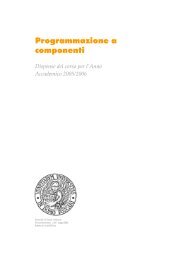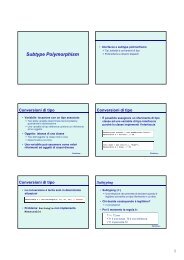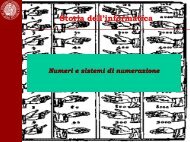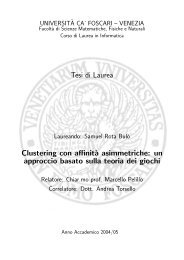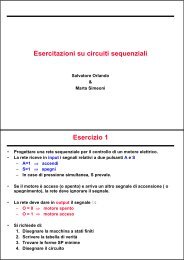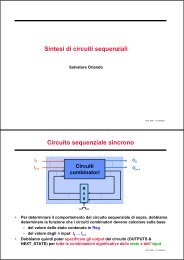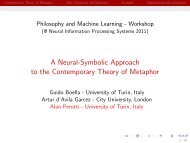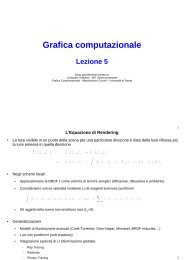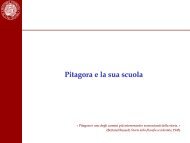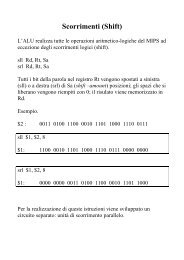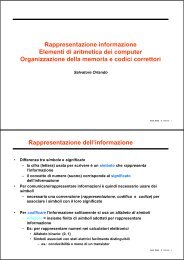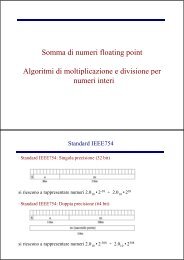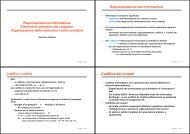Foscari - Dipartimento di Scienze Ambientali, Informatica e Statistica
Foscari - Dipartimento di Scienze Ambientali, Informatica e Statistica
Foscari - Dipartimento di Scienze Ambientali, Informatica e Statistica
You also want an ePaper? Increase the reach of your titles
YUMPU automatically turns print PDFs into web optimized ePapers that Google loves.
People like Tee represent the smallest end of what is now a multibillion pound criminal industry.<br />
Statistics from Cifas, the UK’s fraud prevention service, show that identity theft was up almost 20%<br />
last year, while Internet and card fraud rose to an all-time high of £414m in 2006.<br />
Martin Gill, a criminologist at the University of Leicester, who has stu<strong>di</strong>ed the actions and motivations<br />
of fraudsters - Tee was one of his interviewees - said the perceived ease of fraud, particularly when<br />
using the Internet, was encouraging to those who commit crime. “One of the things that comes through<br />
is the belief that they’re not going to get caught,” he said. Industry insiders say a large number of cases<br />
still go unreported because conviction has proved so <strong>di</strong>fficult.<br />
“The common reaction among companies selling goods is a real frustration at how hard it is to<br />
prosecute and get convictions for people who commit fraud,” said Keith Marsden, managing <strong>di</strong>rector of<br />
192.com, which sponsors Prove-ID, a private industrial forum on dealing with fraud. “It’s a hard<br />
process to go through.” Instead, companies are choosing tougher security procedures and programmes<br />
to educate the public about safe Internet use.<br />
But experienced fraudsters like Tee say that it is still too easy: even chip and pin, which has drastically<br />
cut physical fraud levels, can prove beneficial to the seasoned criminal. “I thought<br />
chip and pin was brilliant - now cashiers think they’ve got no right to look at your card. If I wanted to, I<br />
could pretend to be anyone, because nobody will ever check. It’s a new opportunity for them.”<br />
How to avoid scams<br />
• Never give personal details over the phone. Banks should never ask for pin numbers or codes. • Only<br />
shop on secure websites that <strong>di</strong>splay a padlock or key symbol in your browser. The address should start<br />
https instead of http. • Only open email attachments if you are entirely sure it is necessary.• Be wary of<br />
suspicious-looking emails. Some viruses use the name of somebody you trust as a <strong>di</strong>sguise.<br />
© Guar<strong>di</strong>an News & Me<strong>di</strong>a 2007<br />
First published in The Guar<strong>di</strong>an, 3/5/07<br />
Comprehension check<br />
Match the sentence halves.<br />
1. Tee started online fraud when...<br />
2. He stole as much as £250,000...<br />
3. Tee viewed stealing as...<br />
4. Statistics show that online crime...<br />
5. Criminologists say that people commit online crime because..<br />
.6. Tougher security and public awareness are...<br />
7. People should not give their personal...<br />
8. People should be careful of suspicious...<br />
a. details over the phone.<br />
b. emails and attachments.<br />
c. fun and easy.<br />
d. has risen in the past year.<br />
e. he was a student at university.<br />
f. they think they won’t get caught.<br />
g. through stolen cre<strong>di</strong>t card details, identities and bank accounts.<br />
h. two methods to stop crime.<br />
40



